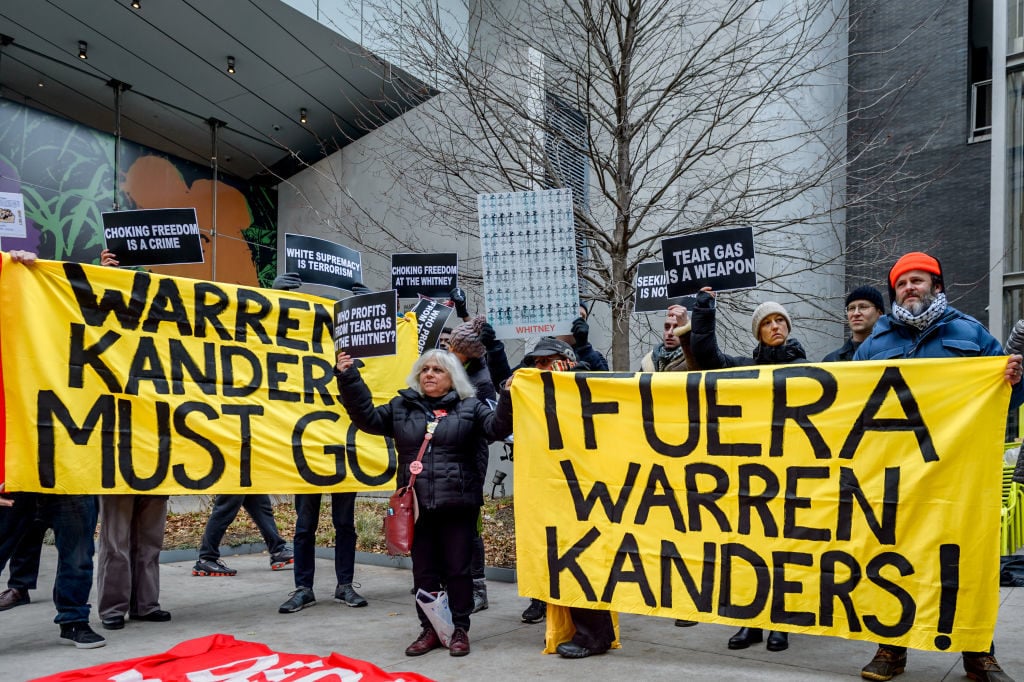Politics
More Than Half of the Artists Included in the Whitney Biennial Are Calling for Trustee Warren Kanders to Resign
Forty-six of the artists included in the upcoming Whitney Biennial have signed on.

Forty-six of the artists included in the upcoming Whitney Biennial have signed on.

Kate Brown

At least half of the artists due to take part in the 2019 Whitney Biennial have added their names to an open letter calling for the museum’s controversial vice chairman, Warren B. Kanders, to step down.
The Whitney has been facing mounting pressure from artists and staff members because of Kanders’s business links to the weapons industry. Kanders is the majority owner and chief executive of the defense manufacturer Safariland, which produces tear gas, batons, and other weapons for the police and military.
Earlier this month, on April 5, the publisher Verso Books shared an open letter signed by 120 academics, artists, and critics that called for Kanders’s removal.
On Monday, the publishers released an updated list of signatories, including 46 biennial participants. Among them are Nicole Eisenman, Hito Steyerl, Joseph Khalil, Martine Syms, Korakrit Arunanondchai, Lucas Blalock, Josh Kline, Elle Pérez, Paul Mpagi Sepuya, and the collective Forensic Architecture.
Other new signatories, who are not presenting in the Whitney Biennial, include Andrea Fraser, Barbara Kruger, Zoe Leonard, and Laura Poitras. Earlier this year, when the participant list was first announced, Chicago-based artist Michael Rakowitz said he was declining to participate in the biennial in solidarity with the nearly 100 Whitney staff members who were the first to publicly denounce Kanders.
“The stakes of the demand to remove Kanders are high and extend far beyond the art world,” the letter states. “Alongside universities, cultural institutions like the Whitney are among the few spaces in public life today that claim to be devoted to ideals of education, creativity, and dissent beyond the dictates of the market. Yet, these institutions have been historically entwined with the power structures of settler colonialism, white supremacy, heteropatriarchy, and capitalism.”
“It is clear that this is an issue that extends beyond the person of Warren Kanders,” Egyptian artist Iman Issa, a signatory and participant in the Whitney exhibition, tells artnet News. “If anything, he is merely a symbol of the manner in which art institutions have become associated with the most violent and oppressive systems, structures, and practices. I signed this letter in the hope that this message resonates for those who are actually in the position to change things, with the understanding that how an institution is run is never fully separate from the content it offers.”
“I believe cultural institutions have a responsibility and the capacity to invoke change towards a more equitable and inclusive society,” says artist Caroline Monnet, a signatory. “Kanders’s involvement with the institution contradicts those values.”
In response to the mounting turmoil, the Whitney’s director, Adam Weinberg, wrote a letter to his staff late last year saying that the museum “cannot right all the ills of an unjust world.” Though he did not mention Kanders by name, Weinberg wrote that “trustees do not hire staff, select exhibitions, organize programs, or make acquisitions, and staff does not appoint or remove board members.”
That same day, Kanders responded to the Whitney staff’s rebellion with his own letter, explaining that he was “not the problem,” while commending the “bravery” of the 95 staff members who spoke out against him.
artnet News has reached out to dozens of Whitney Biennial participants, including those taking part in the Venice Biennale, and to the Whitney Museum for further comment. We will update this article with responses as they arrive.